“I would love to talk to Dave Chappelle. I think he would think it would be hilarious that the only person who got fired over all this is a Black person.”
Krystie Lee YandoliBuzzFeed News Reporter
Posted on October 20, 2021,
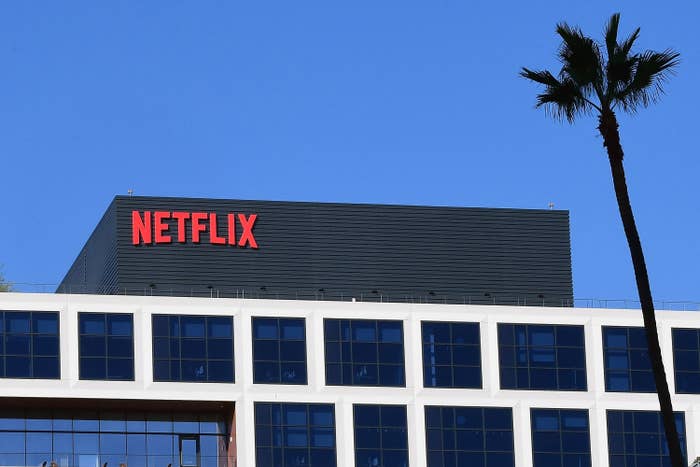
Frederic J. Brown / AFP via Getty Images
When former Netflix employee B. Pagels-Minor got involved in the behind-the-scenes activism in response to Dave Chappelle’s The Closer, they never intended to become the focal point of the widespread conversation sparked by the stand-up special. But since they've been fired, accused of leaking internal numbers about the show to the media, people are no longer just criticizing Chappelle’s anti-trans rhetoric — they’re also finding fault in Netflix’s decision to let go Pagels-Minor, a Black trans employee who is pregnant.
“I didn't want to be the face of this,” Pagels-Minor told BuzzFeed News. “I don't want this to be about me. I want this to be about the commonality of, if we spend time learning and educating ourselves about others, then we're better. I think that's the real thing.”
Chappelle’s latest stand-up comedy special, which was released on Oct. 5, has been widely criticized for including anti-trans jokes and for attacking the LGBTQ community. Netflix employees have been outspoken with their disappointment in The Closer, as well as the company’s responses, culminating in a walkout Wednesday in protest.
Netflix CEO Ted Sarandos doubled down on his stance that the streaming service would not be removing the comedy special, saying in a leaked memo that Chappelle “is one of the most popular stand-up comedians today, and we have a long standing deal with him.”
He added, “Several of you have also asked where we draw the line on hate. We don’t allow titles at Netflix that are designed to incite hate or violence, and we don’t believe The Closer crosses that line. I recognize, however, that distinguishing between commentary and harm is hard, especially with stand-up comedy which exists to push boundaries.”
Representatives for Chappelle did not immediately respond to a request for comment.
Last week, three employees were suspended for attending a director-level meeting that they weren’t invited to (including trans software engineer Terra Field, who has been vocal about Chappelle’s special on Twitter), then shortly reinstated. In response to recent events, trans Netflix employees and allies held a walkout on Wednesday and presented Sarandos with “a list of firm asks” and demands.
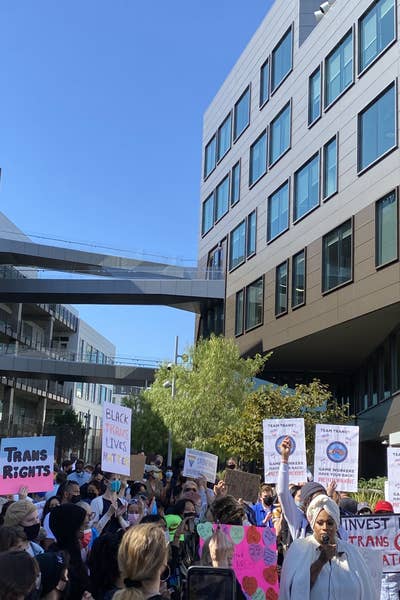
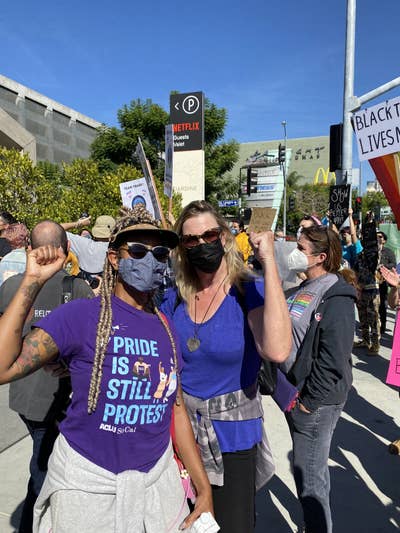
BuzzFeed News
Tensions ran high at the in-person rally outside of Netflix’s Hollywood office building as employees and activists gathered in opposition of a small group of people who identified as TERF and free speech supporters.
Media personality and activist Ashlee Marie Preston, who organized the rally, addressed the crowd, saying, “We’re up against the emergence of a hate economy and there is this manipulation of algorithmic science that distorts the way that we perceive ourselves and others.”
Diana, a Netflix employee who preferred not to use their last name for fear of retaliation, said it wasn’t an easy decision to walk out of work, especially considering there’s some tension with colleagues who disagree with the action. But Diana said they felt a responsibility as a Netflix employee to show up in hopes to reach the company’s leadership.
“I think our leadership mistook how seriously this content has an impact on people,” Diana said. “They’re just talking about making money and making sure we entertain the world and not perhaps thinking about how there are human feelings and lives involved in this and there’s a true impact.”
In response to the walkout, a Netflix spokesperson said the company values its “trans colleagues and allies” and understands “the deep hurt that’s been caused.”
“We respect the decision of any employee who chooses to walk out, and recognize we have much more work to do both within Netflix and in our content,” they added.
Pagels-Minor was originally at the helm of planning Wednesday’s walkout before they were fired on Oct. 15, less than a month before they were set to take parental leave. They were recruited to the company and hired in March 2020 as a data product manager, and prior to being let go from the company they had recently joined the gaming team. Back in June 2020, Pagels-Minor said they were having conversations about Chappelle’s Sticks & Stones Netflix special, which premiered in 2019, with Sarandos and other content leaders. That’s when they said they were inspired to run for Global Lead positions in both trans and Black employee resources groups, which aim to foster communities internally and advocate for Black and trans individuals in the workplace.
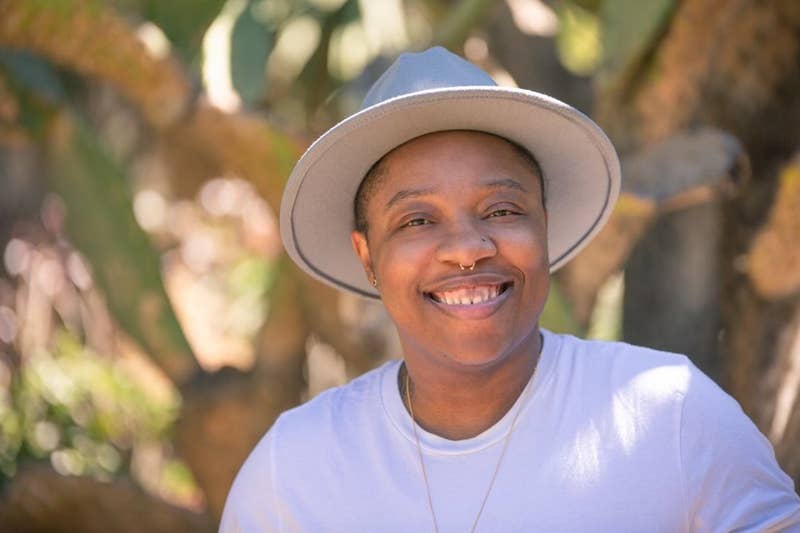
Courtesy B. Pagels-Minor
Former Netflix employee B. Pagels-Minor.
“I was just like, 'I think I could help us actually communicate and translate and make this a more effective conversation,'” Pagels-Minor said. “The ask has never been specifically ‘Take down these specials’ because that's not really how we work. It's always been ‘How can we create content that shows the full human experience, including trans people?’”
A spokesperson for Netflix told BuzzFeed News that Pagels-Minor’s allegations “are not supported by the facts.”
“This employee admitted sharing confidential information externally from their Netflix email on several occasions. Also, they were the only employee to access detailed, sensitive data on four titles that later appeared in the press,” the spokesperson added. “They claim only to have shared this information in an internal document, and that another employee must have leaked it. However, that document was missing data for one title and so cannot have been the source for the leak. In addition to having no explanation for this discrepancy, the employee then wiped their devices, making any further investigation impossible.”
But Laurie M. Burgess, Pagels-Minor's legal representative, told BuzzFeed News that the former Netflix employee never admitted to leaking information to the press because they did not do so. Burgess also said Pagels-Minor is considering taking legal action against Netflix but is hopeful for the outcome of today's protest.
According to Pagels-Minor, they felt empowered to take on leadership roles in both employee resources groups because of the “phenomenal” experience they had working on the product team, where they felt consistently supported by managers and supervisors.
“The product side of the business has been leaps and bounds ahead of the rest of the company in a lot of ways in their thought process. I would tell people who worked in content all the time, ‘I kind of feel bad for you because you don't have the same experience as I do at Netflix,’” they said. “I was so comfortable in my role and in knowing that as long as I did a good job, I would be safe at Netflix. And, of course, now that ended up not being true, but hey, I was naive.”
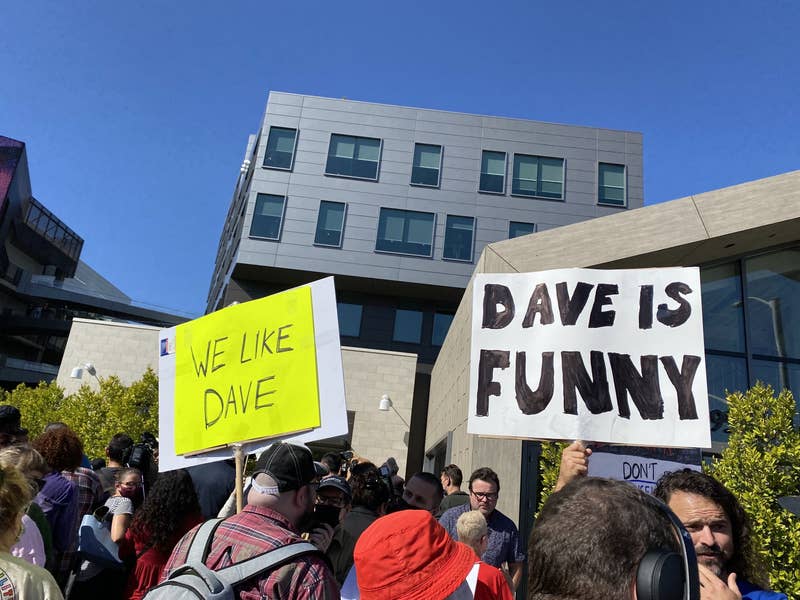
BuzzFeed News
Counterprotesters at Wednesday's rally.
Sarandos apologized to Netflix employees in an email Tuesday night, saying, "I have had time to reflect on our conversations over the last week and I wanted to make clear that I screwed up in how I have engaged with you — sending emails that lacked humanity and were overly simplistic about the real world impact of stories."
He wrote, “I should have first acknowledged the pain and harm that our trans colleagues experience — and also that storytelling has an impact that can be both positive and negative. I am deeply committed to more people seeing their lives being reflected on screen and to creating an even better workplace. We’ve made progress and we have a lot more to do. Artistic freedom is crucial to the creative process and because art is designed to stir emotions, these two values — inclusion and creative expression — can sometimes interact in ways that are very painful: that is the complexity of our work. Netflix is a learning company, and I will keep learning from the many conversations that I am having with colleagues across the company."
Before the special was released, Pagels-Minor said, a colleague who is a part of inclusion and diversity at Netflix sent them an email saying The Closer “might be offensive to some people” and they “might want to prepare” for the probable backlash.
“I was just like, ‘Okay, is it anything different than usual?' And they were like, ‘Not really, it's just like his typical stuff,’” Pagels-Minor said. “If I had known that there were going to be references to TERFs or to misgendering people, I would have reacted very differently.”
Pagels-Minor didn’t watch The Closer, but after reading the full transcript, they said it was clear that the special was “overwhelmingly very unacceptable.”
Their initial reaction to The Closer was criticism that Chappelle didn’t include or mention people of color when discussing the trans community, thinking to themselves, “Oh, so there's no Black trans people?”
“To me, the supposition that Dave Chappelle was making was LGBTQ+ people, who he seems to think are all white, get what they want and Black people don't get what they want, and I was just like, wait one second. I am a Black trans person. I definitely don't get what I want,” Pagels-Minor said. “I can't go to certain places or areas. There are literally Reddit and 4chan channels where Black people come together to talk about how much they hate Black trans people. I think that Dave Chappelle would be very curious about the fact that his special completely forgot about a whole slew of people who are in danger every day.”
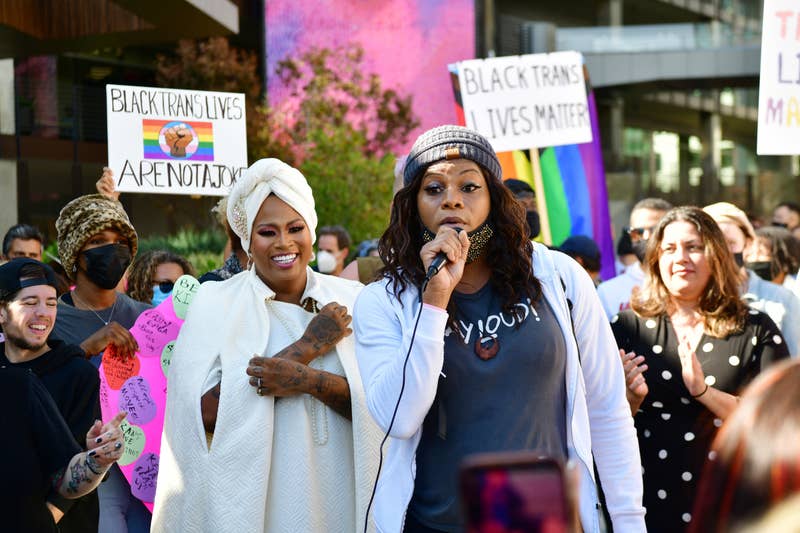
Rodin Eckenroth / Getty Images
Activist Blossom C. Brown and rally organizer Ashlee Marie Preston at the walkout on Wednesday.
According to Pagels-Minor, members of the trans employee resource group started to organize and brainstorm how to reach Netflix leadership in a way they weren’t able to in the past. Originally, they proposed a “trans day of rest,” but the larger group voted in favor of a walkout. Pagels-Minor said that members were also not happy with Sarandos’s emails in response to feedback about the special and that they’re “terrified for Ted [Sarandos] to be the sole CEO of Netflix” based on his internal and external response to the Chappelle controversy.
Pagels-Minor said they were questioned last Thursday about the leaks to the press in a meeting with their manager, an HR representative, and a senior legal representative. They said they told everyone in the meeting they were collecting data about different shows because they were “putting together a memo to prove logically in a data-driven way that if you were to invest in other types of content, you might actually have a better payoff than you do with the Chappelle specials.”
When Pagels-Minor was told it looked suspicious that they were the one who primarily accessed this information, they responded, “I've been sharing this information widely. There are open documents that I created that I shared widely. Anyone could have looked at this information and leaked this information.”
Pagels-Minor didn’t anticipate getting fired from their job at Netflix, saying they were “heartbroken” to be let go from a company they admire, somewhere they had expected to work for years to come and where they “expected to be a part of the solution.”
“I was surprised that I didn't have an opportunity to be a part of an investigation so that I could potentially defend myself,” they said. “I really do fundamentally think that Netflix has the ability to be the media company that tells stories that haven’t been told before. Netflix is uniquely suited to actually do all that because of the core values around how they choose content. Netflix operates around good values, they're good principles, and they're just choosing not to apply them equally.”
But despite everything that’s happened, Pagels-Minor also said it’s “not a bad thing” to get into “good trouble.”
“Ultimately, all I ever cared about was creating a better world, and at some point this conversation has moved forward. If Netflix invests in more content, if others are inspired to learn more about transgender individuals and denounce TERF ideology, then I'm kind of OK with it,” they said. “Because then I created more love, harmony, and respect in the world, and that's what's most important. I am good at my job, so I know I'm going to find another job, but what I can't do is sit by the wayside and let harm come to people who shouldn't be harmed.”
Netflix did not immediately respond to requests for comment on the investigation.
When asked whether they would ever be interested in having a conversation with Chappelle himself, Pagels-Minor said they’re open to the idea.
“I would love to talk to Dave Chappelle,” they said. “I think he would think it would be hilarious that the only person who got fired over all this is a Black person.”




















